NHS Wales: Intense pressure at Royal Glamorgan Hospital
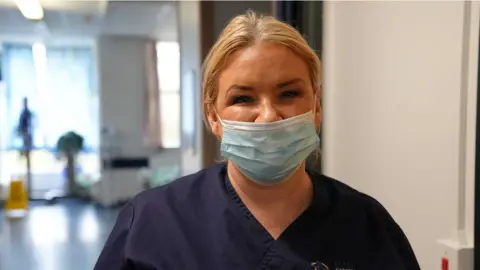 BBC
BBC"It's about flow, or lack of it."
It's just after dawn and senior staff at the Royal Glamorgan Hospital are holding their morning meeting. I've been invited along.
As it turns out it's an opportunity to witness the aftermath of one of the most pressurised days the hospital near Llantrisant has experienced so far this winter.
Jennifer Proctor, the hospital's head of nursing, says: "The demand in the department outstripped the capacity we had in the hospital."
She continues: "The patients kept coming in through the front door but we were unable to look after them in the areas that we had so we had to open up extra areas in the hospital to be able to accommodate those patients safely."
In response, dozens of so-called "surge beds" across the hospital had to be opened up.
But that wasn't straightforward, given a number of the hospital's usual wards were reporting staff shortages.
Tarek Allouni, the health board's acute services manager, explained the difficulty of forward planning.
"You've got your plan for your wards previously, but you can never plan for staff sickness and we were heavily reliant on agency cover coming in and supporting our staff. So we then make moves based on what is adequate for the day and where it's safe to move to."
'Breaking point'
So, at the morning meeting, all wards and departments are trying to identify any patients who might be able to be safely discharged to free up scarce and precious beds - but they are few and far between.
Because once the hospital is full, the pressure in A&E, for example, becomes critical.
Just hours before I visited, the department was at its highest level of alert and those working there were at breaking point.
At one point, it was so full that six ambulances had to queue outside waiting to hand over their patients
And while they're stuck, they can't respond to other calls in area where a life could be at immediate risk.
Many of these pressures are due to the flow of patients through the entire hospital, or more specifically the lack of it.
A&E departments become chock-a-block when there's a mismatch between numbers of patients coming in and the beds available on the wards. Small margins - even as few as half a dozen beds becoming free - can make a big difference.
The hospital has a dedicated team which tries to identify patients who've come to A&E, but given the right care and support might be able to leave without being admitted.
Gemma Pearson, who leads the "stay well at home" team, said: "Of the two assessments we had this morning we've been able to turn them around, they've not needed any involvement.
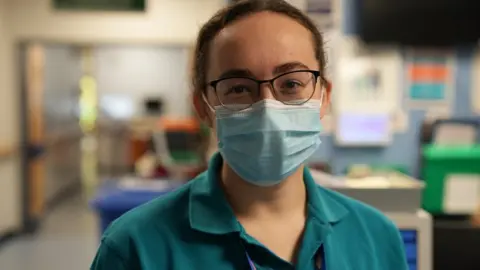
"Ultimately we don't want to keep anyone in hospital and there are people we aren't able to turn around.
"We are an admission avoidance service, but we work with those people so that if they're not able to go home we try and turn them around as quickly as possible."
Claire Walker, the team's principal social worker, said: "We're trusted assessors in this role, so we'll assess somebody straight away and within those few hours we can identify exactly what it is that they need and access that service that's needed to support that discharge home."
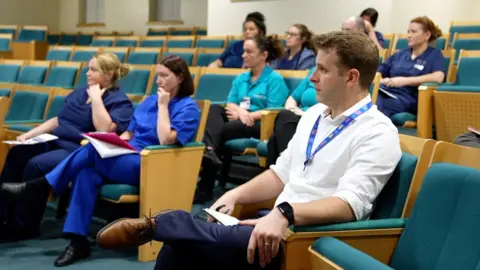
But even with this effort, pretty much all staff tell me there are too many patients medically well enough to leave the hospital who can't - in no small part due to shortages of care in the community.
It's just after lunch when I meet Maria Davies, who is in charge of three of the hospital's medical wards.
'Massive issue'
"About 40% of the patients that we have are predominantly medically fit for discharge and are just awaiting to go home," she says.
"Social care is a massive issue at the moment in the community. We've got patients waiting months just for a nursing home placement or a package of care to be put in place."
After speaking to Maria I meet Mark Walsh, who spent his 61st birthday at the Royal Glamorgan, waiting for a heart procedure. But gladly he can go home soon, freeing up a much-needed bed.
During his stay, he witnessed staff working under intense pressure, and is full of praise for their efforts.
"Last night was a particularly busy shift for the team. I have to say, they were angels," said Mr Walsh.
"They were fantastic. The workload they go through is unbelievable."
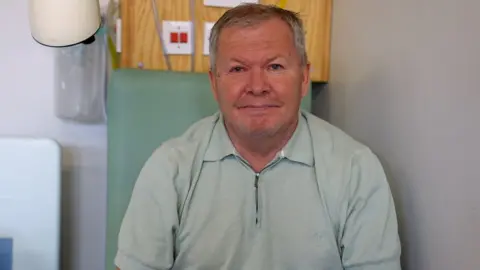
Meanwhile, back in A&E, as the afternoon goes on, the strain is building again.
Even under the most intense pressure, staff will always try to prioritise the sickest patients.
But that means other patients can wait for hours, even days, becoming more and more frustrated.
Chezelle White, the nurse in charge of the A&E day shift, said: "We do get a lot of complaints and mostly it is about waiting. We do try and keep everyone's spirits up - we all work as a team."
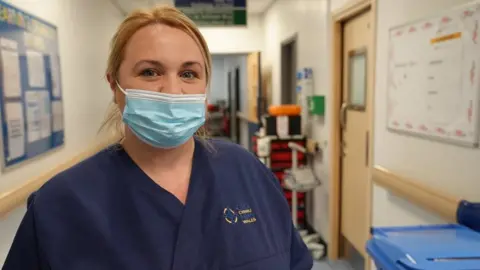 AFP
AFPBut without that sense of team spirit, she said staff would consider their futures.
"Yeah, I think people would leave," she added.
Right across Wales, we know staff are deciding to leave the NHS because of the strain.
And the demand is colossal now - even though the worst of winter is potentially yet to come.
Begging the question: how much further can you stretch a service that already seems to be in a critical condition?
